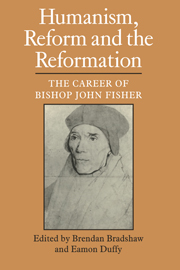Book contents
- Frontmatter
- Contents
- Preface
- List of abbreviations
- Bishop John Fisher, 1469–1535: the man and his work
- John Fisher and the promotion of learning
- The University chancellor
- The bishop in his diocese
- Fisher and Erasmus
- Fisher and More: a note
- The polemical theologian
- Fisher's view of the Church
- Fisher, Henry VIII and the Reformation crisis
- Royal ecclesiastical supremacy
- The spirituality of John Fisher
- Appendixes
- Index
Fisher and Erasmus
Published online by Cambridge University Press: 04 August 2010
- Frontmatter
- Contents
- Preface
- List of abbreviations
- Bishop John Fisher, 1469–1535: the man and his work
- John Fisher and the promotion of learning
- The University chancellor
- The bishop in his diocese
- Fisher and Erasmus
- Fisher and More: a note
- The polemical theologian
- Fisher's view of the Church
- Fisher, Henry VIII and the Reformation crisis
- Royal ecclesiastical supremacy
- The spirituality of John Fisher
- Appendixes
- Index
Summary
Erasmus probably first met Fisher in 1505, during his second visit to England. Erasmus's base was the house of Thomas More in the City of London. Erasmus and More were collaborating on translations into Latin from the Greek of Lucian; and one of Erasmus's concerns was to meet Greek scholars, such as William Latimer. Fisher knew no Greek. But one of Erasmus's surviving letters from London at the end of 1505 is ‘from the bishop's palace’. That might have been the residence, near Lambeth Palace, of the new bishop of Rochester (consecrated November 1504). Fisher was also (October 1504) chancellor of Cambridge University. The University Grace Book for the academic year 1505-6 has an entry allowing Erasmus to proceed to the doctorate of Theology (presumably at the 1506 July commencement). In fact he left England early in June, and took his doctorate in Turin in September 1506. A tradition within Queens’ College in the later sixteenth century was that Erasmus lodged there at some time in the second half of 1505 or the first half of 1506 (when Fisher was president of the college). John Caius added the information that this was at a time when Henry VII visited the University. On the (scanty) evidence of his surviving correspondence, it seems that Erasmus was out of London in April and early May 1506. On 23 April the Grand Feast of the Order of the Garter – the ‘great solemnity’ annually celebrated on St George's Day – was held not at Windsor but in King's College Chapel.
- Type
- Chapter
- Information
- Humanism, Reform and the ReformationThe Career of Bishop John Fisher, pp. 81 - 102Publisher: Cambridge University PressPrint publication year: 1989
- 1
- Cited by



